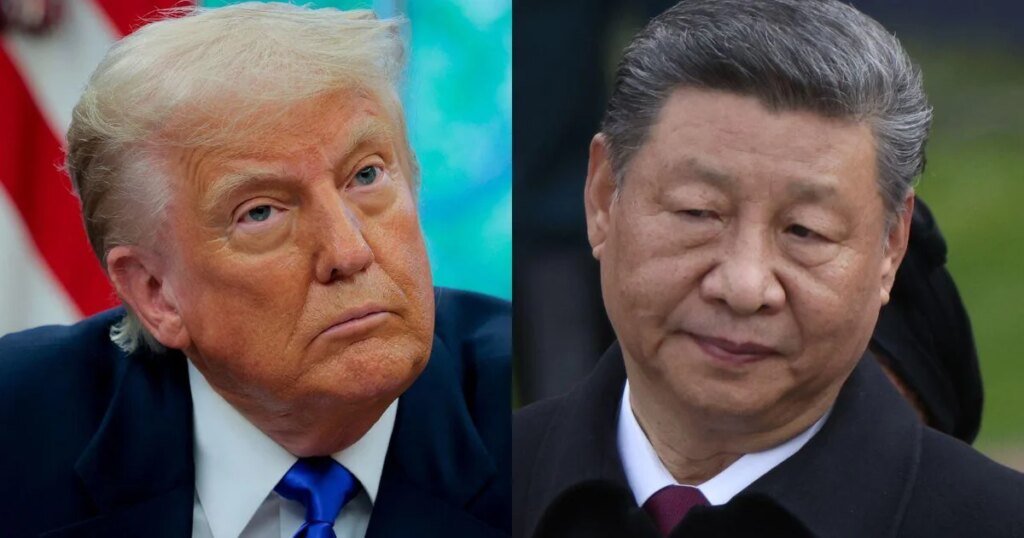In a bold move escalating the trade tensions between the United States and China, President Trump announced a drastic decision to impose a 100% tariff on imports from China, starting next month. This measure follows China’s recent export controls and aims to address issues related to critical minerals and rare earths vital for technological production. The president’s announcement not only raises questions about the future of U.S.-China relations but also introduces new complexities that could affect upcoming negotiations between the two economic giants.
| Article Subheadings |
|---|
| 1) New Tariffs Announced by President Trump |
| 2) China’s Retaliatory Measures |
| 3) The Impact on Financial Markets |
| 4) The Broader Context of U.S.-China Trade Relations |
| 5) Future Negotiations and Economic Considerations |
New Tariffs Announced by President Trump
On Friday, President Trump took to social media to declare an unprecedented 100% tariff on Chinese imports, citing recent actions by China that he deemed aggressive. This move is not a standalone initiative; it adds to existing tariffs, which currently stand at 30%. The announcement indicates that this new tariff could be enacted as early as November 1, depending on any shifts in China’s stance. Trump’s post on the platform Truth Social revealed frustration towards new Chinese regulations that require companies to obtain approvals for exporting products containing even minimal amounts of rare earth materials. “It is impossible to believe that China would have taken such an action, but they have, and the rest is history,” Trump stated, describing these export controls as “extraordinarily aggressive” and a “moral disgrace.”
China’s Retaliatory Measures
In response to the looming tariffs, China swiftly announced measures that include imposing port fees on U.S.-owned vessels docking in its ports. This step is perceived as retaliation against what Beijing described as a “discriminatory” U.S. port fee on Chinese ships. The diplomatic tit-for-tat has heightened tensions even further, suggesting a significant deterioration in the relationships between the two countries. The repercussions of such measures could lead to a wider conflict impacting trade routes, international shipping, and bilateral relations. As both sides scramble to assert their positions, analysts point to potential long-term consequences that could extend beyond immediate financial impacts.
The Impact on Financial Markets
The announcement of new tariffs had immediate ramifications for financial markets. Following Trump’s declaration, major stock indexes saw sharp declines. The S&P 500 plummeted by 2.7%, the Dow Jones Industrial Average faced a drop of 1.8%, and the tech-heavy Nasdaq Composite fell by 3.6%. Investors expressed concern over the escalating trade war, which could disrupt supply chains and hurt corporate profitability. Market volatility is likely to persist as traders react to the ongoing developments in the trade conflict. Analysts warn that prolonged uncertainty could lead to economic repercussions extending beyond the trade sector, impacting various facets of the economy.
The Broader Context of U.S.-China Trade Relations
The U.S.-China economic relationship has been fraught with challenges over recent years. China currently stands as the United States’ third-largest trading partner, following Mexico and Canada. In the past year, the U.S. imported approximately $438.9 billion in goods from China, while exporting around $143.5 billion worth to the Asian nation. Trade tensions have risen dramatically, with tariffs having peaked in early months, reaching as high as 145% on U.S. goods and 125% on Chinese imports. The goal for both nations has shifted towards negotiating a more comprehensive trade agreement that would ideally lower these punitive tariffs and stabilize relations.
Future Negotiations and Economic Considerations
Looking ahead, the United States and China are set to have the potential of high-stakes negotiations in the coming weeks. President Trump is scheduled to meet with Chinese President Xi Jinping later this month, although there are indications that Trump views the meeting with skepticism, stating, “there seems to be no reason” for the dialogue. As both countries grapple with tariff complexities, the U.S. administration must consider the economic implications of sanctions and restrictions. The negotiations are not solely dependent on trade, as complexities surrounding technology transfers, national security, and even educational exchanges also play pivotal roles in shaping discussions.
| No. | Key Points |
|---|---|
| 1 | President Trump announced a 100% tariff on Chinese imports, effective next month. |
| 2 | China retaliated by imposing port fees on U.S.-owned ships docking in its ports. |
| 3 | Major stock indexes fell sharply following the announcement of the new tariffs. |
| 4 | The U.S.-China trade relationship has deteriorated significantly over the past months. |
| 5 | Upcoming negotiations between the two nations could impact various sectors of the economy. |
Summary
The recent tariffs imposed by President Trump mark a significant escalation in the ongoing trade tensions between the United States and China. With both countries engaging in retaliatory measures, such as China’s new port fees on U.S. vessels, the economic implications can be far-reaching. As stock markets react negatively, the future of U.S.-China relations hangs in the balance, pending further negotiations and potentially strategic shifts by either nation.
Frequently Asked Questions
Question: What are the implications of the new 100% tariff on Chinese imports?
The new 100% tariff could significantly raise the prices of imported Chinese goods, affecting consumers and businesses that rely on these products. It may also lead to retaliatory measures from China, further escalating trade tensions.
Question: How has China’s recent export control affected trade?
China’s new export controls on rare earth materials make it challenging for companies to export critical components, potentially impacting industries reliant on these materials, including technology and automotive sectors.
Question: What is the status of upcoming negotiations between the U.S. and China?
The next talks between U.S. and Chinese officials are uncertain; President Trump has expressed skepticism about the necessity of upcoming meetings with Chinese President Xi Jinping, highlighting the delicate state of their trade relations.


